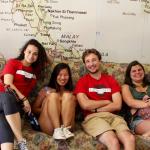Support
Over the course of my four months in Thailand, I worked with Dr. Paul Chambers of Chiang Mai University to examine the international dimensions of insurgency in the Patani region of Southern Thailand. Often referred to as the Thai Deep South, Patani is the local name for the three southernmost provinces in Thailand along the Malaysian border. These three provinces are ethnically, linguistically, and religiously distinct from the rest of Thailand. A former kingdom in its own right, Patani is populated by Malay Muslims who have long resisted integration by the larger Thai Buddhist state. Throughout the 20th century, armed conflict has riven the area, leading to thousands of deaths.
I became interested in this topic as I am a Government Major focused on the Middle East and when I decided to go to Thailand, I wanted to connect my previous work to this new area. Thailand, and Southeast Asia in general, is one of the central hubs of the wider Islamic world. I hoped to gain an understanding of how events in the Middle East shaped the Thai Deep South and vice versa. Through my research, which involved meeting with several local experts on the conflict in Patani as well as US Foreign Service officers, I identified the ways in which the conflict in Patani has been shaped by the wider Islamic World and the Middle East in particular.
While my original hypothesis, that salafi-jihadism was being imported into the area in a significant way, was disproven, I was able to identify a deep historical network of ties which bound and continue to bind Patani to both its Southeast Asian Muslim neighbors and to more removed places such as Saudi Arabia, Egypt, Syria, Pakistan, Afghanistan and Bangladesh. These ties included direct support and training for rebels by Middle Eastern states, the growth of foreign funded Islamic movements, the long history of cross cultural exchange and education abroad, and the recent importation of Islamic revivalism. All of these ties have fundamentally shaped the development of the insurgency and its recent violent and Islamist character is in many ways a reflection of developments in the wider Islamic world.
My research would not have been possible without the support of St. Lawrence which funded my trip to Bangkok to meet with US Embassy staff as well as my flight down to Hat Yai in the Thai south where I got to see some of Malay Muslim society first hand. My independent study in Thailand informed my decision to conduct a Government Honors Thesis focused on Thailand and Turkey and it has given me a much wider understanding of Islamic World which I have made the focus of my academic career here at SLU.
